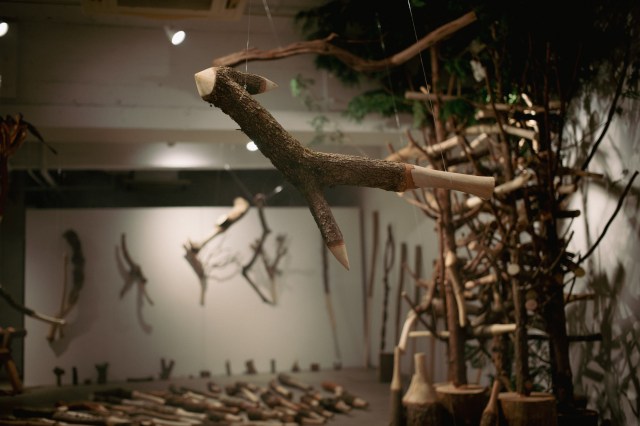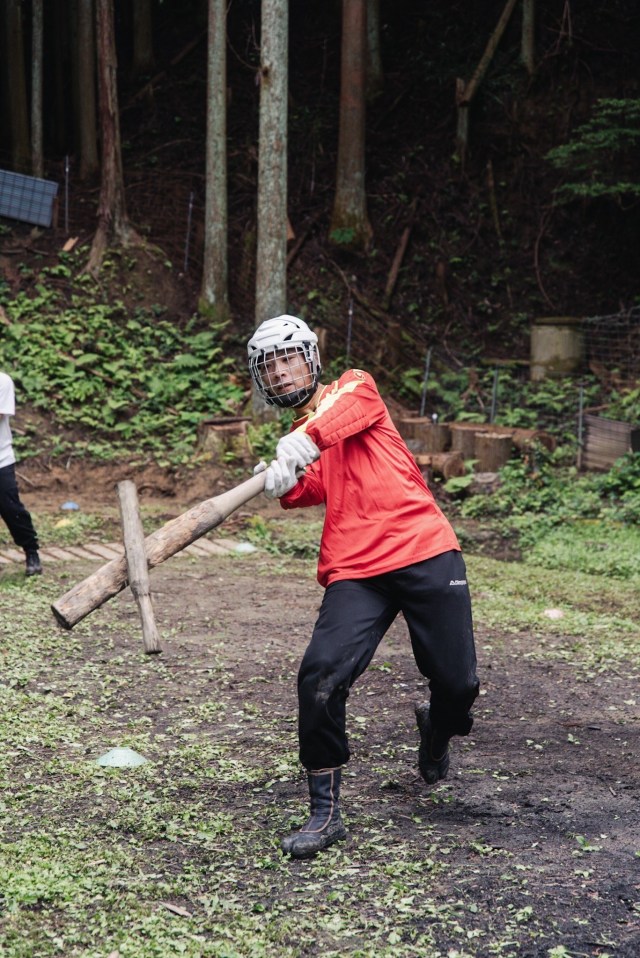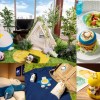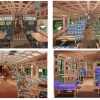
Clubs aren’t just for cavemen and goblins anymore!
When was the last time you’ve even thought about a big old wooden club, let alone held one?
Granted there isn’t as much use for a heavy lump of wood as there used to be, but after literally thousands of years of humans and clubs going hand in hand, it feels a little sad that we turned our back on them so abruptly. That is something that the All Japan Club Association is trying to change by reminding us why we fell in love with clubs in the first place.
▼ All Japan Club Association President Shohei Azuma presenting a club to a future clubber
棍棒協会会長から棍棒を授与されるみちひと坊や。棍棒のような子になれと願いを込めて笑 pic.twitter.com/k9CdvdZbq4
— 汽水空港 (@kisuikuko) May 16, 2022
The roots of the All Japan Club Association, or Zen Nihon Konbo Kyokai (ZNKK) in Japanese, can be traced back to Shohei Azuma. Born in Osaka Prefecture, Azuma moved to neighboring Nara Prefecture in 2015 to pursue a career in farming. He took up residence in Uda City where, like in many rural parts of Japan, the population was rapidly aging and declining.
With this decline in human activity many forests in the area have become overgrown, and Azuma decided to help out with maintenance by joining a project to replace the artificially homogenous rows of sugi trees with more diverse species similar to what the forests had before the influence of humans.
In 2021, while working on the project he came across a piece of wood that was rather big but also too small to make any furniture with. Not knowing what to do with it, he carved it into a club and gave it to a friend as a gag gift. It turned out to be a surprise hit and this outbreak of club-fever quickly blossomed into the All Japan Club Association.
Tapping into the zeitgeist of people wanting to post pictures of them doing unique things to their social media profiles, clubbing was an almost overnight success. In February, an event was held in Osaka City that had around 200 clubs on display and also allowed visitors to swing them at another piece of wood to break it.
▼ A report from the Osaka club exhibition
The event was a hit for two reasons: First, it reminded us that, unlike sleek modern replacements such as baseball bats or truncheons, clubs are made from a solid piece of natural wood so each one is unique and retains the charm of the specific tree from which it came. It was likely for that reason that 40 clubs were purchased to be used either as tools or pieces of home décor. During the four-day event, periodic workshops were also held where guests were given the chance to make their own clubs.
Secondly, it probably comes as no surprise that bashing stuff with a club can do wonders for stress. This stress release is heightened by the warmth of the wood and feeling of reconnecting with nature. In fact, the club swinging became so popular that they ended up having to turn people away.
▼ “As we tweeted earlier, the test hitting section ended already because all the logs have been broken.”
また、先にツイートしたとおり、試し殴りコーナーは丸太が全て折れてしまったため既に終了しております。 #大棍棒展 pic.twitter.com/YYhLxvPrdl
— ZNKK全日本棍棒協会 (@greatkonbou) February 19, 2022
In September, at a special pop-up store in the Shibuya Tokyu Hands store in Tokyo clubs were sold for prices ranging from 5,000 to 70,000 yen (US$34-US$483) and in sizes ranging from 30 centimeters to two meters (1-6.5 feet). The tools used the make them were also on display.
▼ The store was called Club Market
やってます #棍棒市場
— ZNKK全日本棍棒協会 (@greatkonbou) September 17, 2022
すでに6本お買上げいただきましたああああありがとうございまああああああす!#棍棒 pic.twitter.com/eQQcPLU9iN
Despite all this popularity, Azuma and the All Japan Club Association know that social media-driven trends are fleeting and something more permanent would be needed, so they’ve also been hard at word creating konbo tobashi (club flying) a sport centered entirely on clubs.
In konbo tobashi, one player catapults a club into the air by whacking it with another club, earning points based on the distance it travels. Meanwhile, players on the opposing team can attempt to whack the flying club back with their own clubs, thus reducing the distance it flew.
ちなみに大宇陀神殴仏sは「おおうだかみなぐりぶっつ」と読みます pic.twitter.com/SwnsVI9r7x
— ZNKK全日本棍棒協会 (@greatkonbou) June 16, 2022
Although simple in principle, a deceptive complexity lies in the clubs themselves given that no two are alike and so they can have unpredictable curves, weights, and textures. Moreover, the clubs would be made from trees indigenous to the areas where teams from all over Japan originate, making them just that much more diverse.
On 7 October, the 0th All Japan Kondo Tobashi Championship: ZNNK X Cup was held. The “X” refers to two crossed clubs, and given the fact that the All Japan Club Association is hardly a year old and already developed an original sport, this is considered something of a trial event, hence the “0th” designation.
いよいよ近づいてきた #ZNKKXCUP 第0回全日本棍棒飛ばし選手権大会。
— ZNKK全日本棍棒協会 (@greatkonbou) September 24, 2022
10月7日(金)=棍棒の日、世界は終わる。そしてKONBOUの支配する世界が新たに始まるのであるボッコオオオオオオン‼︎‼︎
実にこれはホモサピエンス20万年ぶりの快挙であり、諸君は諸手を挙げて喝采することとなる #棍棒飛ばし pic.twitter.com/BQKjyGYpcY
Although there’s a lot of fun and humor to the All Japan Club Association, it’s all in the name of raising awareness to appreciate and protect Japan’s forests by maintaining them and improving the diversity of tree species in them. For that reason, and the fact that hitting stuff is really fun, there really is no reason that clubs can’t make a big comeback in Japan. Maybe one day we’ll even see club clubs in schools.
Source: All Japan Club Association, PR Times, Mainichi Shimbun, Netlab, Minkei
Images: PR Times
● Want to hear about SoraNews24’s latest articles as soon as they’re published? Follow us on Facebook and Twitter!


 Is Japan overworking its teachers? One exhausted educator says, “YES!”
Is Japan overworking its teachers? One exhausted educator says, “YES!” Soon-to-be-demolished, historical host club opens up its doors to family-friendly fun【Pics】
Soon-to-be-demolished, historical host club opens up its doors to family-friendly fun【Pics】 Captain Tsubasa manga author celebrates FC Barcelona’s Japan visit in the best way he knows
Captain Tsubasa manga author celebrates FC Barcelona’s Japan visit in the best way he knows Elegant new bar and club space especially for crossdressers to open in Tokyo
Elegant new bar and club space especially for crossdressers to open in Tokyo Japanese Youth Conference petitions government to end compulsory after-school club activities
Japanese Youth Conference petitions government to end compulsory after-school club activities Red light district sushi restaurant in Tokyo shows us just how wrong we were about it
Red light district sushi restaurant in Tokyo shows us just how wrong we were about it Sandwiches fit for a sumo served up in Osaka【Taste Test】
Sandwiches fit for a sumo served up in Osaka【Taste Test】 Japanese ramen restaurants under pressure from new yen banknotes
Japanese ramen restaurants under pressure from new yen banknotes Tokyo Tsukiji fish market site to be redeveloped with 50,000-seat stadium, hotel, shopping center
Tokyo Tsukiji fish market site to be redeveloped with 50,000-seat stadium, hotel, shopping center Starbucks Japan adds a Motto Frappuccino to the menu for a limited time
Starbucks Japan adds a Motto Frappuccino to the menu for a limited time McDonald’s new Happy Meals offer up cute and practical Sanrio lifestyle goods
McDonald’s new Happy Meals offer up cute and practical Sanrio lifestyle goods French Fries Bread in Tokyo’s Shibuya becomes a hit on social media
French Fries Bread in Tokyo’s Shibuya becomes a hit on social media Pokémon Sleep camping suite and guestrooms coming to Tokyo Hyatt along with giant Snorlax burgers
Pokémon Sleep camping suite and guestrooms coming to Tokyo Hyatt along with giant Snorlax burgers Beautiful Red and Blue Star luxury trains set to be Japan’s new Hokkaido travel stars
Beautiful Red and Blue Star luxury trains set to be Japan’s new Hokkaido travel stars Anime girl English teacher Ellen-sensei becomes VTuber/VVTUber and NFT
Anime girl English teacher Ellen-sensei becomes VTuber/VVTUber and NFT All-you-can-drink Starbucks and amazing views part of Tokyo’s new 170 meter-high sky lounge
All-you-can-drink Starbucks and amazing views part of Tokyo’s new 170 meter-high sky lounge More foreign tourists than ever before in history visited Japan last month
More foreign tourists than ever before in history visited Japan last month Studio Ghibli releases new action figures featuring Nausicaä of the Valley of the Wind characters
Studio Ghibli releases new action figures featuring Nausicaä of the Valley of the Wind characters New private rooms on Tokaido Shinkansen change the way we travel from Tokyo to Kyoto
New private rooms on Tokaido Shinkansen change the way we travel from Tokyo to Kyoto Starbucks reopens at Shibuya Scramble Crossing with new look and design concept
Starbucks reopens at Shibuya Scramble Crossing with new look and design concept Studio Ghibli glasses cases let anime characters keep an eye on your spectacles
Studio Ghibli glasses cases let anime characters keep an eye on your spectacles Beautiful Ghibli sealing wax kits let you create accessories and elegant letter decorations【Pics】
Beautiful Ghibli sealing wax kits let you create accessories and elegant letter decorations【Pics】 Studio Ghibli releases Kiki’s Delivery Service chocolate cake pouches in Japan
Studio Ghibli releases Kiki’s Delivery Service chocolate cake pouches in Japan New definition of “Japanese whiskey” goes into effect to prevent fakes from fooling overseas buyers
New definition of “Japanese whiskey” goes into effect to prevent fakes from fooling overseas buyers Our Japanese reporter visits Costco in the U.S., finds super American and very Japanese things
Our Japanese reporter visits Costco in the U.S., finds super American and very Japanese things Studio Ghibli unveils Mother’s Day gift set that captures the love in My Neighbour Totoro
Studio Ghibli unveils Mother’s Day gift set that captures the love in My Neighbour Totoro New Japanese KitKat flavour stars Sanrio characters, including Hello Kitty
New Japanese KitKat flavour stars Sanrio characters, including Hello Kitty New Pokémon cakes let you eat your way through Pikachu and all the Eevee evolutions
New Pokémon cakes let you eat your way through Pikachu and all the Eevee evolutions Disney princesses get official manga makeovers for Manga Princess Cafe opening in Tokyo
Disney princesses get official manga makeovers for Manga Princess Cafe opening in Tokyo Sales of Japan’s most convenient train ticket/shopping payment cards suspended indefinitely
Sales of Japan’s most convenient train ticket/shopping payment cards suspended indefinitely Sold-out Studio Ghibli desktop humidifiers are back so Totoro can help you through the dry season
Sold-out Studio Ghibli desktop humidifiers are back so Totoro can help you through the dry season Japanese government to make first change to romanization spelling rules since the 1950s
Japanese government to make first change to romanization spelling rules since the 1950s Ghibli founders Toshio Suzuki and Hayao Miyazaki contribute to Japanese whisky Totoro label design
Ghibli founders Toshio Suzuki and Hayao Miyazaki contribute to Japanese whisky Totoro label design Doraemon found buried at sea as scene from 1993 anime becomes real life【Photos】
Doraemon found buried at sea as scene from 1993 anime becomes real life【Photos】 Tokyo’s most famous Starbucks is closed
Tokyo’s most famous Starbucks is closed One Piece characters’ nationalities revealed, but fans have mixed opinions
One Piece characters’ nationalities revealed, but fans have mixed opinions We asked a Uniqlo employee what four things we should buy and their suggestions didn’t disappoint
We asked a Uniqlo employee what four things we should buy and their suggestions didn’t disappoint Princesses, fruits, and blacksmiths: Study reveals the 30 most unusual family names in Japan
Princesses, fruits, and blacksmiths: Study reveals the 30 most unusual family names in Japan Talented Japanese sixth graders pull off mind-blowing jump-rope routine【Video】
Talented Japanese sixth graders pull off mind-blowing jump-rope routine【Video】 What happens when a single woman joins a Japanese host club bus tour around Tokyo?
What happens when a single woman joins a Japanese host club bus tour around Tokyo? Osaka hotel has amazing all-you-can-eat takoyaki and kushikatsu breakfast buffet
Osaka hotel has amazing all-you-can-eat takoyaki and kushikatsu breakfast buffet Get a little sass with your glass: Osaka oba-chan cup clingers are here
Get a little sass with your glass: Osaka oba-chan cup clingers are here Tokyo’s newest hot spring bathhouse and foodie spot opening next to Japan’s biggest fish market
Tokyo’s newest hot spring bathhouse and foodie spot opening next to Japan’s biggest fish market “We don’t want to be girls. We just want to be cute!” The future of crossdressing in Osaka
“We don’t want to be girls. We just want to be cute!” The future of crossdressing in Osaka Still got Club Nintendo points? New Zelda and Mario shirts, pouches, and more available in Japan
Still got Club Nintendo points? New Zelda and Mario shirts, pouches, and more available in Japan Tokyo host club opens its doors to female cosplayers for special photo shoot event
Tokyo host club opens its doors to female cosplayers for special photo shoot event Survey asks Japanese teens which school club they want to join, and “kitaku” club is top choice
Survey asks Japanese teens which school club they want to join, and “kitaku” club is top choice Real-kitty-litter snow globes coming soon to Japan’s capsule toy vending machines【Photos】
Real-kitty-litter snow globes coming soon to Japan’s capsule toy vending machines【Photos】 Six of the “20 Coolest Arcades in the World” are in Japan! Want to know what Japan makes of that?
Six of the “20 Coolest Arcades in the World” are in Japan! Want to know what Japan makes of that? YouTube goes crazy for “Bubbly” high school girls’ amazing retro ’80s dance routine 【Video】
YouTube goes crazy for “Bubbly” high school girls’ amazing retro ’80s dance routine 【Video】 Japan Self-Defense Forces get a fan club, for some reason
Japan Self-Defense Forces get a fan club, for some reason Japan Sumo Association bans girls from prohibiting in practice event as controversy continues
Japan Sumo Association bans girls from prohibiting in practice event as controversy continues Starbucks Japan’s newest Frappuccino is a summer cake delight
Starbucks Japan’s newest Frappuccino is a summer cake delight High school swimming club makes a splash with their synchronized performances【Video】
High school swimming club makes a splash with their synchronized performances【Video】
Leave a Reply